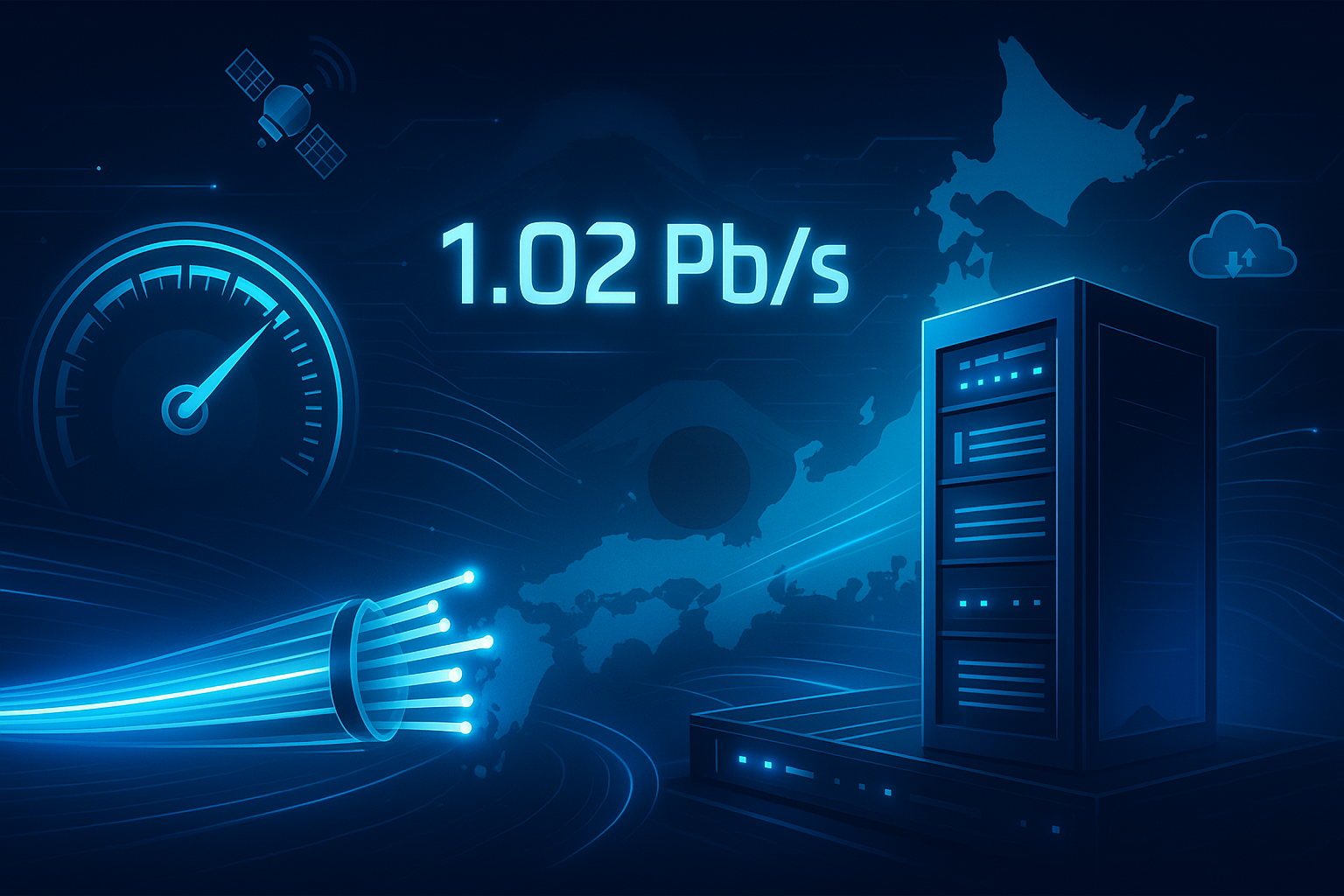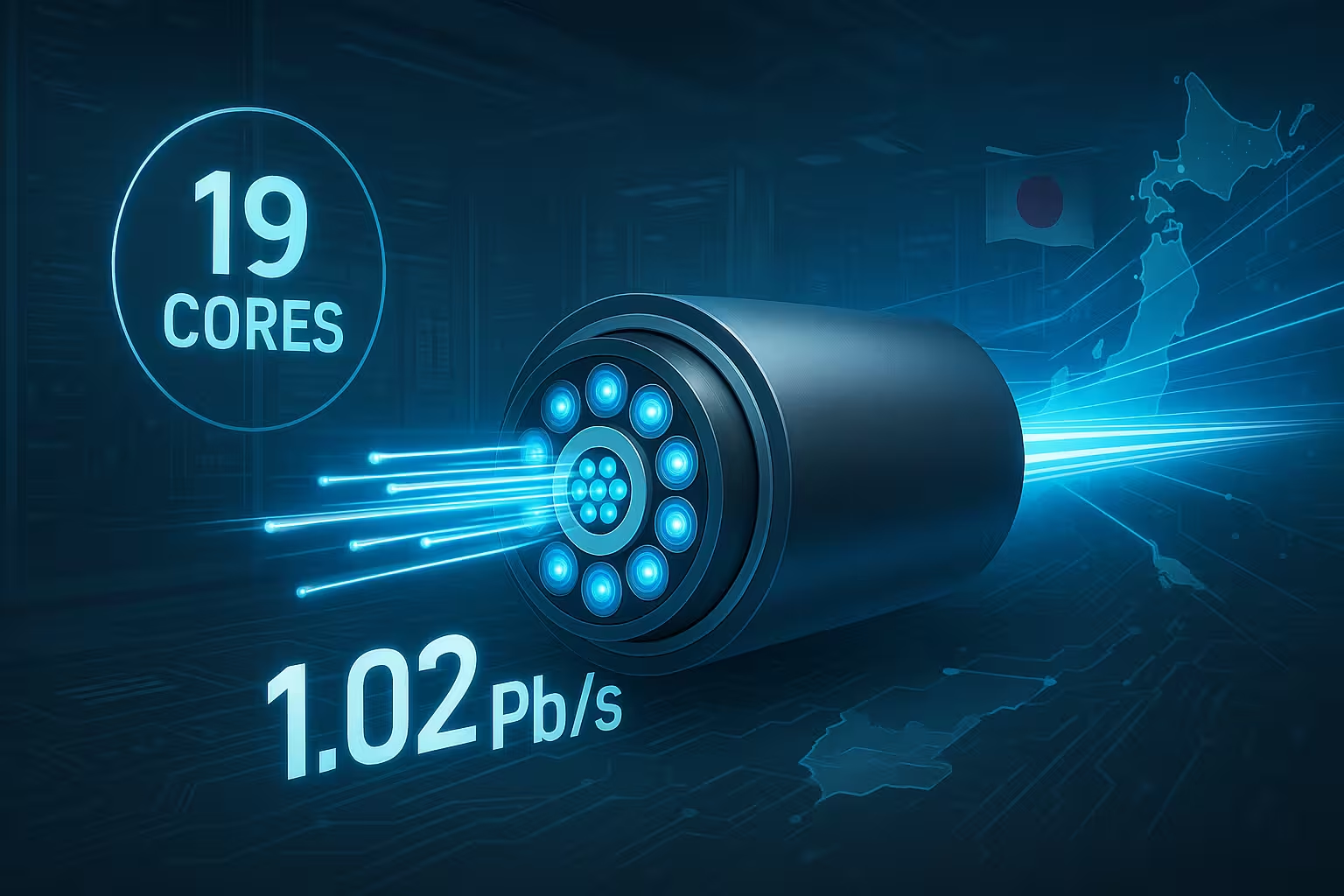Introduction
Japan has once again stunned the global tech community by setting a new world record in internet speed. According to reports from multiple technology publications, researchers in Japan have achieved an unprecedented data transfer speed of 1.02 petabits per second (Pbps), a feat that could revolutionize global internet infrastructure and the future of data transmission.

The groundbreaking experiment was conducted by engineers at Japan’s National Institute of Information and Communications Technology (NICT), leveraging advanced optical fiber technologies. This new development could potentially transform how data is transferred across continents, enabling almost instantaneous data access and transfer speeds that were once thought impossible.
What Is 1.02 Petabits per Second?
To put this achievement into perspective, 1 petabit equals 1,000,000 gigabits. At 1.02 Pbps, Japan’s new internet technology could theoretically allow you to download the entire Netflix library in less than a second. For comparison, this is 16 million times faster than the average internet speed in India and more than 100,000 times faster than common home broadband connections worldwide.
According to a report published by The Times of India, the record was achieved using a special 19-core optical fiber cable, which is still compatible with existing infrastructure. This means that despite the futuristic capabilities, the technology could be integrated into current systems with minimal overhauls.
How Was It Achieved?
The achievement was made possible by employing a 19-core optical fiber, as opposed to traditional single-core or multi-mode fibers. Each core acted as an independent channel, allowing simultaneous high-volume data transmission.
According to NICT’s official press release, researchers used wavelength-division multiplexing (WDM) to further expand the bandwidth, packing more information through each optical channel. The combination of WDM and the 19-core structure allowed them to hit the 1.02 Pbps threshold across a distance of more than 50 kilometers.
This wasn’t just a lab-based test with short cables; the data transfer sustained over a long distance means real-world feasibility is closer than we think.
Why This Matters: Real-World Applications
This achievement is not just a technological flex—it has massive implications for:
- Artificial Intelligence (AI) and Machine Learning: Training large-scale AI models requires massive data movement across servers. This technology could drastically reduce the time needed.
- Medical Imaging and Genomics: High-resolution medical scans and genomic data can be transferred instantly for faster diagnosis and research.
- 4K/8K Streaming and AR/VR: Rich multimedia content can be streamed in real-time without buffering.
- Cloud Computing and Data Centers: Cloud services can become more responsive and efficient with reduced latency.
- Global Scientific Collaboration: Projects like climate modeling or particle physics often involve massive datasets. Fast data sharing means quicker breakthroughs.
Compatibility with Existing Infrastructure
One of the most significant aspects of this breakthrough is that it doesn’t require a completely new infrastructure. According to researchers, the 19-core fiber can be integrated into standard cable systems, making mass adoption more plausible in the near future.
This stands in contrast with other experimental setups that require prohibitively expensive or impractical custom installations. Japan’s technology appears both powerful and scalable.
Global Reactions and Comparisons
Tech analysts around the world have responded with amazement. According to Meristation Tech, Japan’s record leaves other nations far behind. For instance, the average speed in the U.S. is around 200 Mbps, while in India, it hovers around 50 Mbps.
The 1.02 Pbps record overshadows even previous Japanese records. In 2021, NICT had achieved 319 terabits per second. The new number is not just a slight improvement—it’s a leap into a new technological era.
Challenges Ahead
While the potential is enormous, there are still challenges:
- Cost of Deployment: Though compatible with existing systems, widespread implementation of 19-core fiber will require investment.
- Device Compatibility: End-user devices will also need upgrades to handle such speeds.
- Security Concerns: Faster data means faster breaches if not secured properly.
Despite these hurdles, experts believe the benefits far outweigh the limitations, especially for industries where time and data size are critical.
What This Means for the Future
The internet is the backbone of our modern society. From remote work and education to healthcare and entertainment, we rely on it every day. A speed of 1.02 Pbps could usher in a new era where latency is negligible, massive data is handled in real time, and accessibility is truly global.
According to experts, this technology could be available commercially within the next 5–10 years, especially in countries that invest early in high-speed optical infrastructure.
Conclusion
Japan’s achievement of 1.02 Petabit per second internet speed is not just a world record—it’s a signal of what the future holds. With immense potential across healthcare, education, research, and entertainment, this breakthrough has positioned Japan as a leader in next-gen internet technology.
As the rest of the world watches closely, one thing is certain: the future of data is fast—blazing fast.
Sources: The Times of India, NICT Japan, Meristation Tech, official NICT press release.




